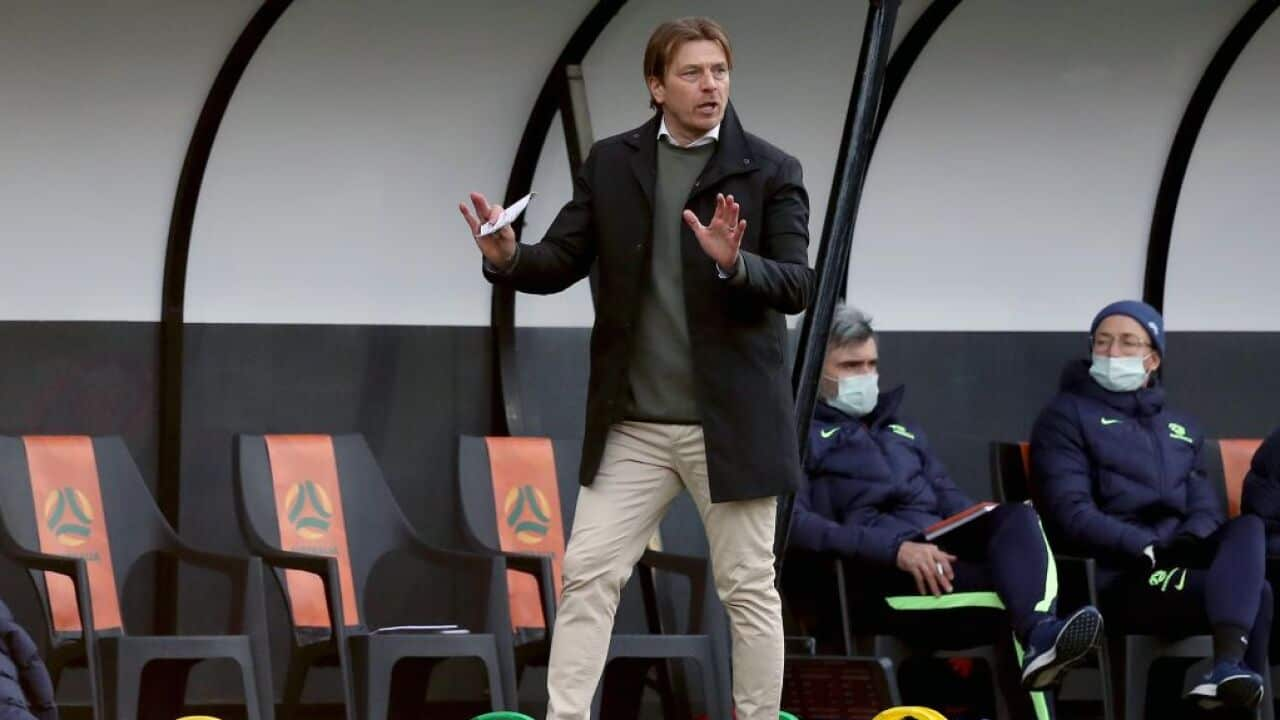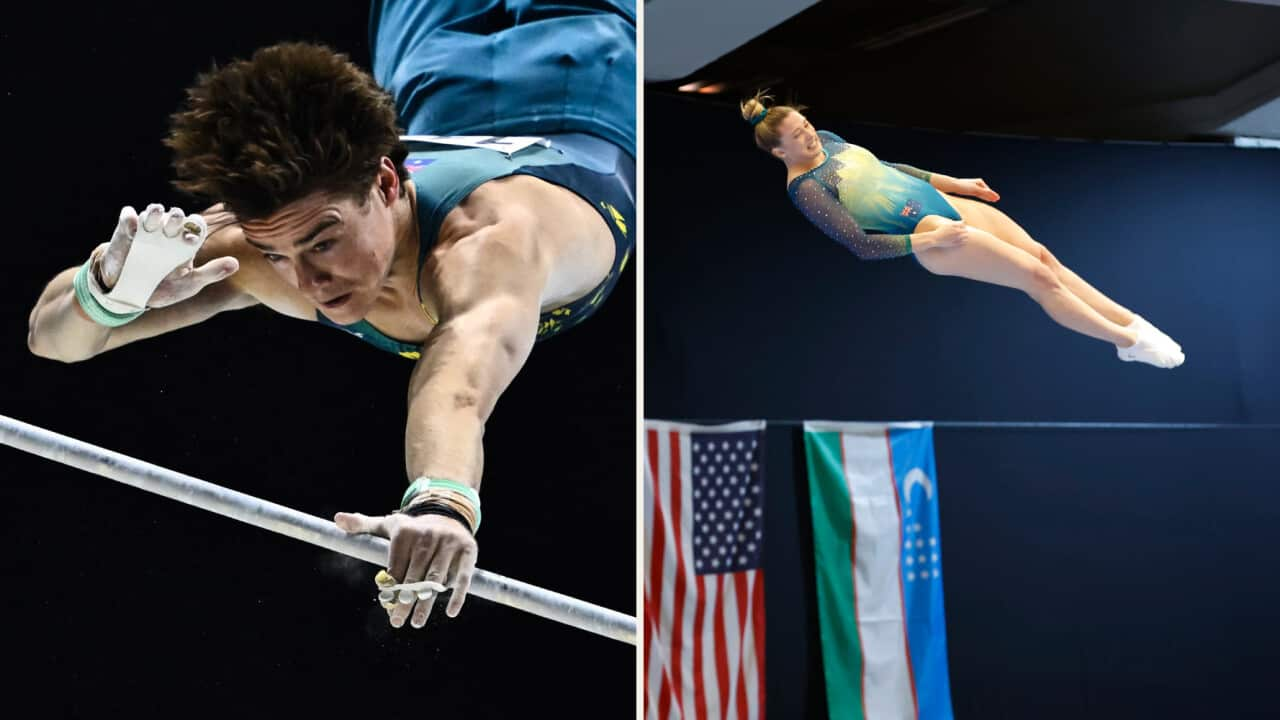Gustavsson will officially take charge of the Matildas for the third and fourth time in the coming days when he oversees friendly matches against Denmark on Friday morning and future Olympic opponents - and the land of his birth - Sweden next Wednesday.
Seeking a better showing than in heavy defeats to Germany and the Netherlands in April, the 47-year-old has brought 25-players into camp in preparation for the coming fixtures; the 18-player squad for the Olympics (16 outfielders and two goalkeepers) likely to be drawn from the current group.
Steph Catley, Elise Kellond-Knight, Ellie Carpenter and Tameka Yallop highlight the veteran additions that have returned after missing April’s losses - the first games the side had played in well over a year - while Alex Chidiac, Amy Harrison, and Kyra Cooney-Cross are amongst others that have been brought into the squad.
While the camp and clashes with the Danes and Swedes represent further important steps towards establishing chemistry and bedding down form ahead of Tokyo 2020 - especially after the 5-0 and 5-2 defeats to the Germans and Dutch - they also loom as a vital proving ground for Gustavsson to assess the adaptability of his squad ahead of the fixture crunch to come.
Due to open their Olympic campaign against New Zealand in Tokyo on July 21, the Matildas will be forced to quickly back up to face next Wednesday’s opponents Sweden on July 24 in Saitama. On July 27, they will then face one of the stiffest tests in football when they take on defending World Champions - and Gustavsson’s old side - the United States in Kashima.
Assuming the Matildas progress through the group stages with a top-two finish in Group G, or as one of the two best third-placed sides from the three groups, they will then play a quarter-final on July 30 with a semi-final to then potentially follow on August 2.
The bronze medal match will then take place on August 5, while the gold Medal game will occur a day later.
Quite the gauntlet.
“We only have two days’ rest between each game of the Olympics and we need to have fresh legs,” Gustavsson said.
“What I’m looking at now is to see where’s the chemistry between players? What can the right side look like? What can the left side look like? The backline chemistry and working with the goalkeeper.
“But also, looking at which player can cover multiple positions, because we need some players that have multiple functions that can play multiple positions in the Olympic roster.”
Nonetheless, though the ability of a squad to roll with the punches and display flexibility in positioning is no doubt key in major tournaments, Gustavsson isn’t simply preaching changes for change’s sake.
With players such as Sam Kerr and Carpenter, widely regarded as amongst the best in the world, at his disposal, the ‘Tillies boss acknowledged that some players in his squad will retain just a singular mission.
“There are some players with specific skill sets that shouldn’t have to care about playing two or three different positions, that are just focused on being them and bringing their key skills,” he said.
“Then around those players, you have to have a few multifunctional players that can step in and play in those roles.”
Gustavsson’s need to display adaptability in approach also extends to his own approach to the Australian collective.
Unlike club football, where significant amounts of time spent together allows for regimented approaches to be embedded in a squad (hence prevailing trends of automation at the highest levels of club football), international teams offer no such luxuries.
Keeping this in mind as he seeks to foster attacking and aggressive identity - one that had already been largely embedded in the mindset of the Matildas prior to his arrival - Gustavsson says that he’s not going to attempt to box his side into one certain formation that he believes in, nor shoehorn players into roles based on pre-existing notions.
Instead, he’s going to look at the ingredients that have been laid out before him and attempt to concoct them into a recipe that can deliver results.
“I’ve said to the players in the first meeting back in January when we had the videoconference, I said that from a national team perspective, at least that’s my view, you need to build the team with the qualities of the players that you have,” he said.
“I’m not a coach that comes in and says, ‘hey, here’s Tony’s playbook’ and either the player fits into it or not. I look at the opposite, meaning who are the best players and what skill sets do they have and how can I build tactics and formations based on their core qualities?
“There are some core values in this team way before I arrived here in terms of taking a step forward, being aggressive, being attacking minded. I do think that maybe Football Australia chose me as the coach because I’m the same as a person. I am very aggressive in defending, taking a step forward, very attacking minded.
“So in that sense, the principles and the DNA are going to stay. The formation itself is not the identity. The system and formation itself is not the DNA of a team. It’s the principles and how we play.
“I think in football in general, there’s a lot of emphasis and focus on the starting lineup. If you look at statistics, especially from tournaments, you can see what happens in the last 30 minutes and the last 15 minutes.
“I think maybe not enough do we coaches emphasise the finisher, not just the starter but the finishing eleven. For me, it’s not the starting XI and then subs -- we don’t even use [the word] subs, by the way, we use gamechanger - people that come off the bench and change the game. “Numbers-wise we have just 16 outfielders for the Olympics, we can’t have ten starters and six subs, we need to have 16 starters.”
Beyond the X’s and O’s, Gustavsson has frequently spoken of the need to foster a culture and chemistry that can deliver results in the Olympics and beyond; re-establishing connections that may have been lost during the long, COIVD-enforced break between matches and building a rapport between existing and newly introduced squad members.
This need for connection, however, also extends to Gustavsson himself and, having had little experience in the Antipodean region in the past, could have easily proven easier said than done - especially when a lot of communication has been, by necessity, conducted through a computer screen.
The Swede, however, says that he’s relishing the opportunity to integrate himself into and strengthen the existing environment with the Matildas and that, while it’s his first time in charge of an Australian team, his cosmopolitan history in coaching has prepared him for what lies ahead.
“I love this part of it, the leadership and connection to people,” Gustavsson explained. “First and foremost, I work with people and secondly with players.
“I’ve had the privilege over these 20 years to work with a lot of different players from a lot of different nations both on the men’s and the women’s side. Everything from Africa, to South America, to North America, to Europe, to Asia and so forth.
“I’ve worked with a lot of different cultures and different people and that’s what I love in leadership.
“I’m amazed and so inspired both by the staff and the players about the culture here. The work ethic is phenomenal, the sense of humour I love and then there’s the commitment to always want to get better.
“You can sense it as a coach coming into this environment, all the staff members and all the player just thrive every day there’s feedback. What can I do better? Can I do this better? What can we do? We have a coach in Mel [Andreatta, the Matildas Assistant Coach] that has introduced, lifters and shifters. How can we lift and shift every day to get better?
“For me, it’s been a privilege, I’m so happy to be part of this team and this culture.”











